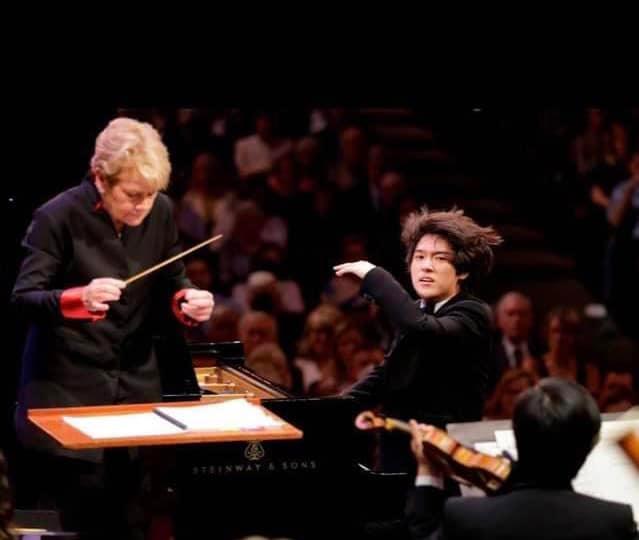Two jurors speak out about Van Cliburn winner
NewsThe Texas pianist Ben Laude has canvassed analysis from two Van Cliburn jurors on what made Yunchan Lim’s performance of the Rachmaninov D minor concerto the outright winner. ‘It’s like Yunchan creeping up behind the conductor, tickling her,’ says Laude.
The inside views come from Anne-Marie McDermott and Jean-Efflam Bavouzet, both regular contributors to the Tonebase site.
There’s some interesting jury-room breakdown here.






Fascinating analysis
Standing ovacations are de rigeur in the U.S.
Olga Kern’s Rach 3 is still the greatest in my book.
I’ve enjoyed Olga’s Rach 3 for years. But I never considered it the GOAT. She needed more speed and power in the final movement.
Yunchan took the 3rd movement fast and furious without compromising technique or artistry.
His Rach 3 is at or near the GOAT.
Come on! A great young talent does not equal the greatest artist.
Lim’s interpretation of all 12 of Liszt’s transcendental études has convinced me he is among the greatest virtuosos of all time!
https://m.youtube.com/watch?v=KsGLmrR0BVs&t=2945s
And he mastered all 12 études when he was just 17 years old!
https://m.youtube.com/watch?v=6UgWtfRUmHY&t=495s
There’s nothing he can’t play!
It’s so hard to play the piano, and to play it this well. It’s a miracle when it happens and ends up with such a beautiful result. The boy-young man is a genius of the first order.
As Schumann said “Hats off, gentlemen – a genius!”
The performance is utterly convincing and magisterial, to be sure. But should expressions like “the greatest,” let alone “GOAT,” be considered at all relevant in art?
I realize that this occurred in the context of a competition, but wasn’t it Bartok who said that competitions are for horses? Perhaps the most significant aspect of the performance is that it sounded nothing like a “competition” performance, where participants usually strive to demonstrate their competence — here, Lim seemed totally unconcerned with demonstrating his prowess; rather, he wanted to create an aesthetic experience, which he absolutely did, and one of the highest order.
but wasn’t it Bartok who said that competitions are for horses?
But how to find the GOAT if you don’t have them?
You just can not find GOAT for everyone, especially with competition. Arts in general based on personal preference, so it is possible to have a performance which satisfy everybody, in my opinion. You can find your GOAT artist only! I
Really enjoyed hearing the analysis!
Fantastic analysis. And finally something truly worthwhile for SlippedDisc to present. And no matter what anyone may argue, an absolutely stunning performance.
Finally? Please leave this site. You are a wealthy man who utilises our facilities for free, Mr Sekhri, and all you can do is gripe.
Sekhri bleu!
For free Norman? Then what did you do with my 55 GBP annual fee I paid? Happy to email you proof!
I will check that. Please do not renew. We’re happy to take criticism but ingratitude is foul.
I’m concerned with the alterations to the score. Can that get out of hand? Is this young talent a better composer that SR?
Would we allow this with Chopin or Bach?
I wonder about taking liberties with the score. Are there rules to follow at competitions?
Have a listen to what Marc-André Hamelin did to the Schubert F minor Impromptu, seemingly because he imagines himself a more accomplished composer than Schubert was. Doing this (adding his own coda) left the door wide open for anyone else to abuse classical music as he/she wishes.
Not Bach, but definitely Chopin or Rachmaninoff.
Thank you for posting this! Very interesting and valuable insight! Of course, with a touch of a subtle manipulation which is always present when you compare different performances. Could be quite useful for young pianists to watch, IMO.
Absolutely great analysis! Thank you very much! Fascinating access to understand the uniqueness of an interpretation!
Was this his post winning performance or was he still in competition. Marin and the orchestra weren’t very objective here and must’ve influenced the jury or were his competitors so lacking?
This analysis is a gift. Thank you very, very much.
Very interesting, many thanks for this.
Enjoyed your analysis quite a bit. Was very impressed by Lim’s performance. It made me eager to hear what he does next. It reminds me of how I felt after I heard Kissin’s Carnegie debut recital in 1990. After the first few notes everyone in the hall knew they were in the presence of an artist. Judgment was suspended and everyone simply savored what was before them. I’ve only experienced this a handful of times. Talent at this level is above criticism, whether one likes the performance/interpretation or not. I look forward to hearing whatever he decides to do next.
As for the “best” – I don’t know what that means. I love so many performances of Rach 3 for so many reasons. Horowitz – especially the earliest (1930) one, cuts and all, Argerich, Ashkenazy, Earl Wild, Rachmaninoff himself. Cliburn for his tone alone – has anyone ever produced such a beautiful, full piano tone at such volume? And the microphone couldn’t do justice to the sound he produced in a hall.
Don’t forget Orozco’s with Edo de Waart on Philips. Great LP sound, too (as always with Philips).
I still get teary-eyed remembering his performance. So much brilliance and compassion. The soul of the great Rachmaninoff reached out to comfort us in our sorrow. Thank you, Van Cliburn Competition. Thank you you, Yunchan. Thank you to all who taught this magnificent pianist.
Thank you so much for the analysis. I felt the beginning a little bit too reticent for such a grand concerto, but now I can understand the reason behind. Lim’s performance is an absolute phenomenon, needless to say. Actually I liked it better than Horowitz or Argerich versions. It feels surreal that anybody would say this.
Not at all, at least concerning Horowitz, whose interpretations were often borderline grotesque.